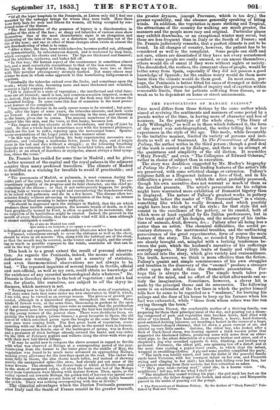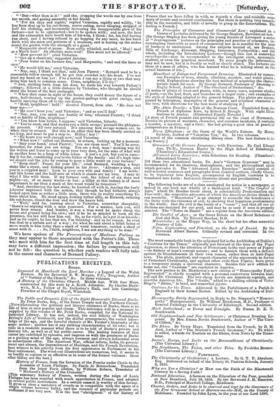THE PROVOCATIONS OF MADAME PALISSY..
Tars novel differs from those fictions by the same author which aimed at reviving the sentiments and manners of some period by a pseudo writer of the time, in having more of character and less of manners. In the prototype of the whole class, "The Diary of Lady Willoughby," as well as in those which followed it, the form of the novel- was autobiographical, the writer telling his or her
experiences in the style of the age. This mode, while favourable
to the imitative manner, limited its variety- of persons and inci- dents as well as of treatment. In The Provocations of Madame Palissy, the author writes in the third person ; though a good deal of the work is carried on by dialogue, and there is an attempt at the quaintness and simplicity of the old diction. It resembles "Mary .Powell," and even "The Colloquies of Edward Osborne," rather in choice of subject than in execution. The story was doubtless suggested by Mr. 3forley's biography of Palissy the Potter ; and the leading features of the artist's life
are preserved, with some artistieal change or extension. Palissy's religions faith as a Huguenot induces a love of God, and in his difficulties a pious reliance ; which the artist probably possessed, though his own narrative does not warrant so much of them as the novelist presents. The artist's persecution for his religion might have warranted more exhibition of Romanist bigotry than is displayed. The nature of Palissy's greatest works in pottery is brought before the reader of "The Provocations" in a vision, something like which he really dreamed, and which possibly might have been the origin of his style ; for that style did not consist in the excellence of the pottery, or its enamel, both of which were at least equalled by his Italian predecessors, but in the truth and spirit of his designs, and the accuracy of his imita-
tions of animals, fruit, flowers, &o. - Palissy after all being less a potter than an artist The chemical difficulties, the sordid pe-
cuniary distresses, the matrimonial troubles, and the unflinching perseverance of the great experimenter, form of course the main feature of the story. The facts, as recorded by Palissy himself, are clearly brought out, mingled with a lurking tenderness be- tween the pair, which the husband's narrative of his sufferings scarcely supports. Many little traits of family and village life are infused into the story, which give variety and vraisemblanee.. The truth, however, we think is more effective than the fiction. Palissy's quaint and simple reminiscences of his own struggles and troubles in the discovery of the "enamel" produce a stronger effect upon the mind than the dramatic presentation. Per- haps this is always the case. The simple truth takes pos- session of the mind, and no effort of the artist afterwards can sa- tisfy the imagination. Sometimes, however, a clever hit is made by the principal theme and its accessories. The following
scene is an extension of the few lines in which the potter himself tells how he came to be regarded as a "madman," for burning his palings and the floor of his house to keep up his furnace when his fuel was exhausted, while "those from whom solace was due ran crying through the town."
"Marguerite Pierrot, the comfortable mother of a thriving family, was preparing for them their principal meal of the day, and pouring out a steam- ing compound of pork and vegetables into beechen bowls, half filled with slices of rye-bread. Her husband, Jean Pierrot, a heavy, hard-featured, good-natured-looking labourer, sat mending a basket in the corner of a huge, square, funnel-shaped chimney, that let down a great current of air, and carried up very little smoke. Antoine, the eldest boy, who looked after a flock of black-faced sheep, was leaning against a thick wooden pillar that supported the blackened rafters, producing some wild notes from an elder. woodpipe, to the silent delectation of a younger brother and sister, and of a shepherd's dog who crouched opposite to him, blinking, and looking very profound. Fortunee, the eldest girl, sate spinning tow of a distaff, and at the same time rocking a poplar-wood cradle, in which slept the infant, wrapped in swaddling-clothes. A pig and some poultry completed the party.
"The latch was hastily raised, and into the midst of the peaceful family circle burst Victorine, with her youngest infant on her arm, and Fleurette crying and clinging to her skirt ; her black hair falling over her face, her eyes almost starting from their sockets, her face colourless as ashes. "'He's gone mad—raving mad!' cried she, in a hoarse voice. 'Oh, neighbours ! tell me, tell me what I shall do!'
"The shepherd-boy ceased trilling his pipe ; the girl staid her foot on the cradle-rocker; the father dropped the basket, and stood up ; and Marguerite paused in the midst of pouring out the potage.
• The Provocations of Madame Palissy. By the Author of "Mary Powell." Pub- lished by Hall and Virtue.
"'But—what then is it?' said she, dropping the words one by one from her mouth, and gazing amszedly at her friend. "'For six days and nights,' replied Victorine, rapidly and wildly, he 'has been shut up in his out-house, scene eating, never sleeping, stripped of half his clothing, and incessantly increasing the insupportable glow of his furnace—not to be approached—not to be spoken with; and now, the heat and the exhaustion have bereft him of his wits, I think; for, his fuel having run short, and I having refused to go begging for any more, he has burst forth with the mien and gestures of a madman, and is tearing up the stakes round the garden with the strength of a giant.' "Marguerite stood at !muse. Jean softly whistled, and said, 'Mad! mad as a March bare! An absolute were-wolf! This must not be allowed.'
How prevent it ? ' cried Victorine. " ' Get up a eharivari,' suggested Antoine. "'Pour water on his furnace fire,' said Marguerite, and end the farce at once.'
" 'He would kill me,' cried Victorine.
"'Nay, nay, I think not that,' said Jean Pierrot : Bernard used to be a reasonable fellow enough till he got this crotchet into his bead. I've not tried my hand on him yet: I've a notion lean say a thing or two that may bring him back to common sense. Come, neighbour, 1'11 try!'
"And, striding forth from his door, he made his way towards Palissy's cottage ; followed at a little distance by Victorine, who thought he should stand the brunt of the first onslaught. "When they came in eight of the house, they could descry the figure of a man, half-dressed, tearing up the garden-palings with great energy, and hastily carrying them off to the out-house. " Hold, neighbour ! hold !' shouted Pierrot, from afar. He does not hear me—'
"'He won't hear you,' said Victorine ; 'and so you'll find.'
"'Nay, nay, you speak too hastily of him,' returned Pierrot ; think not so hardly of him, neighbour.' "'You know him better, I suppose,' said Victorine, bitterly. "'You're crest, and that makes you a little savage,' pursued the phlegma-
' tic peasant. 'All very natural. It's amazing how savage women can be when they're crossed. But this is an affair that has been clearly carried on too kng, and must be put a stop to. Hilloa! hoy !'
"'He hears you well enough now,' said Victorine. "'What now ? ' called out Bernard, in return, looking up for a moment. "'Stay your band,' cried Pierrot; you are clean mad! You'll be sorry, hereafter, for what you are doing. You are a fool,man ! making way for the wolves and foxes to come up to your very door, for the sake of what will in another hour be a heap of white ashes. .A. jest's a jest, but you're carry- ing it too far, considering you're the father of the family : and it's high time we should end the joke by coming to pour a little water on your furnace.'
"'Keep aloof! Pause, for your life !' cried Bernard, wielding a hues stake like a straw, and looking grand in his furor. Advance a step, and you're a crippled man! Look to your own wife and family ! I am noble ! and this house and the half-acre on which it stands are my own. I may do wl2at I like with them. If my furnace cool, the labour of six days and nights—ay, of as many weeks—is lost : a billet at this instant is of more importance to me than a stack of fire-wood would be tomorrow !'
And, shouldering the last stake, he hurried off with it, leaving the burly labourer impressed with the notion, that though he had hitherto always looked upon him as rather a little man, there was in reality something Ti- tanic about him. He stood agape looking rather silly, as Bernard, entering his out-house, closed the door and drew the heavy bolt.
"'Well,' said he, turning about to Victorine, somewhat sheepishly, there's no arguing with a man possessed. For a maniac, look you, will never hear reason. And besides, it was a true word he spake about the house and ground being his own; and if he be so minded to burn all the premises, the law will bear him out. So, as for right, he's got it on his side ; -and as for might, he has that too, I'm thinking: and as for reason, he even has that in a certain sort of a way ; for what he said about a billet being of more worth to him today than a stack of wood tomorrow, carried a show of sense with it. . . . So, efaith, neighbour, I see not anything to be done.'" We have spoken of The Provocations of Madame Palissy as they may appear to those acquainted with the Potter's life. Those who meet with him for the first time at full length in this tale may have a different impression ; the failure by comparison will not be felt : the question is, whether such readers will fully take in the career and character of Bernard Palissy.



























 Previous page
Previous page